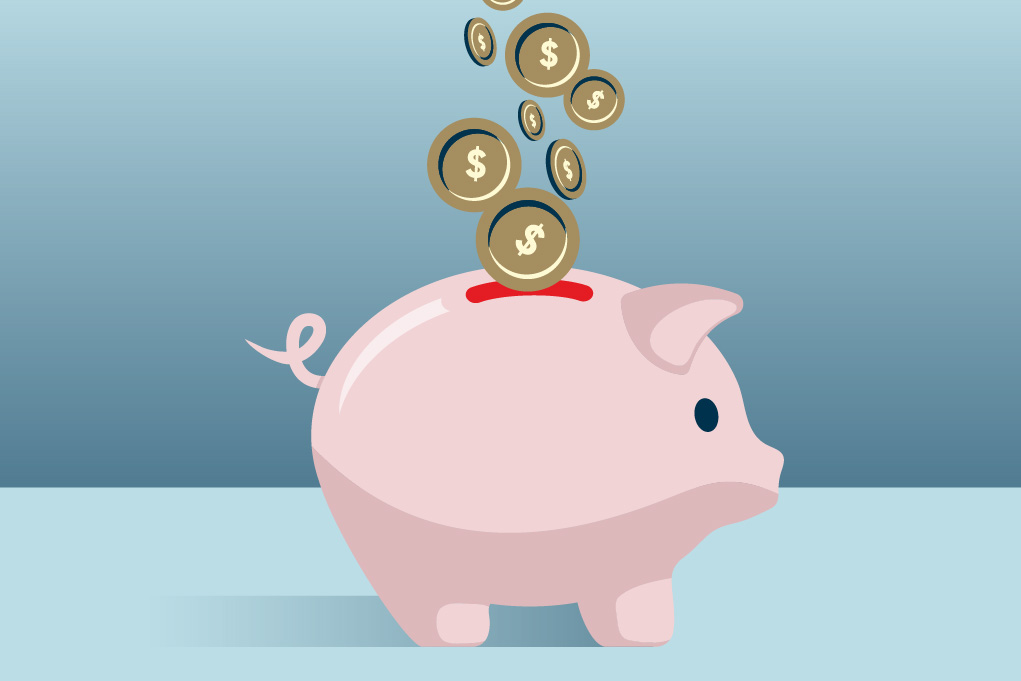1. To grow your money
Raise your hand if you’d like to make a bit more money without having to work. Good news: there’s a solution for that. When you put your money into an RRSP (registered retirement savings plan), that’s exactly what happens. Your investments generate interest… which generates more interest. Careful – we’re not telling you to leave your 9-to-5 if you contribute to an RRSP. But know that the earlier you start to save, the more time your investments have to grow.
Here's an example: Maria is 20 years old and contributes $5,000 per year to her RRSP; Ali is 30 years old and contributes $10,000 per year to his account. Once they reach 40, they will each have contributed $100,000 of their own money. Because of the principle of compound interest, given an annual interest rate of 3.2%, Maria can expect a total of $137,119 in her RRSP. Ali, on the other hand, will only have $115,700. When you start saving early and make $21,419 more in the long term, it’s almost like magic.
2. To achieve your goals
You might be wondering what percentage of your income should go towards your savings. The truth is that there’s no magic number. It’s better to determine an amount you’d like to save up for a set period of time, then calculate how much money per paycheque you should save to reach your goal. Last step: make a budget with what’s left. It’s the best way to achieve your objectives!
There are many
kinds of savings plans that could help you reach your goals, depending on what they are:
- For short-term plans, like going on a trip or paying off student loans, consider high-interest savings accounts. The money you save will grow rather quickly and you’ll be able to take it out at any time, penalty-free.
- If you want to become a homeowner, an RRSP is what you need. Keep in mind that you need a down payment worth at least 5% of the value of the property you want to buy (learn more in section 4).
- Don’t have any specific goals in mind, but you still want to save? First of all, good for you! We can suggest opening a TFSA. It’s a flexible investment vehicle that offers better returns than a regular account. You can easily withdraw money from a TFSA as needed.
No matter the goal you’re trying to achieve, the secret is saving systematically! Set up automatic transfers from your bank account and the rest is just gravy. And remember that financial advisors are there to help you reach your objectives, whatever they may be.
3. To reduce your taxable income
Welcome to adulthood, where “income tax return” is now part of your vocabulary (not just your parents’). If you want tax season to go relatively smoothly, meet your new BFF: the RRSP. All the money you contribute to this account throughout the year will be deducted from your taxable income.
If you have $5,000 in your RRSP and earn $60,000 in salary, the government will calculate your taxes based on a $55,000 income. As a result, you’ll either receive a tax refund, or you’ll have less taxes to pay. And if your BFF was invested in mutual funds, shares or bonds, all the gains and interest you earned are non-taxable during the accrual period.
Still a little confused when it comes to RRSPs and TFSAs? That’s okay. We put together a little guide to help you.
4. To secure a down payment
Have you heard of the HBP? Don’t be intimidated by the acronym; it refers to the Home Buyers’ Plan, which is a program that allows you to withdraw from your RRSP and put it towards your down payment.
Once you’re ready to buy a home, you’ll need a down payment of at
least 5% of the property’s purchase price. If you’ve been saving for a while and managed to grow your RRSP,
good job! The government will allow you to withdraw up to $35,000 for
a down payment on your first home, without any penalty. .
5. To prepare for retirement
You’ve just entered the work force, and maybe you’ve even landed your dream job. Let’s say things keep going at this pace and life expectancy reaches 108 years old; you may look forward to taking a break. If you learned how to manage your budget, took on healthy financial habits and have a decent retirement plan, you’ll be able to stop working at a reasonable age. Hopefully before you turn 108.
There are plenty of ways to save money when you’re young. Some saving methods are easy as pie, while others require a bit more strategy.
Ready to achieve your savings goals? We’re here to answer your questions.
